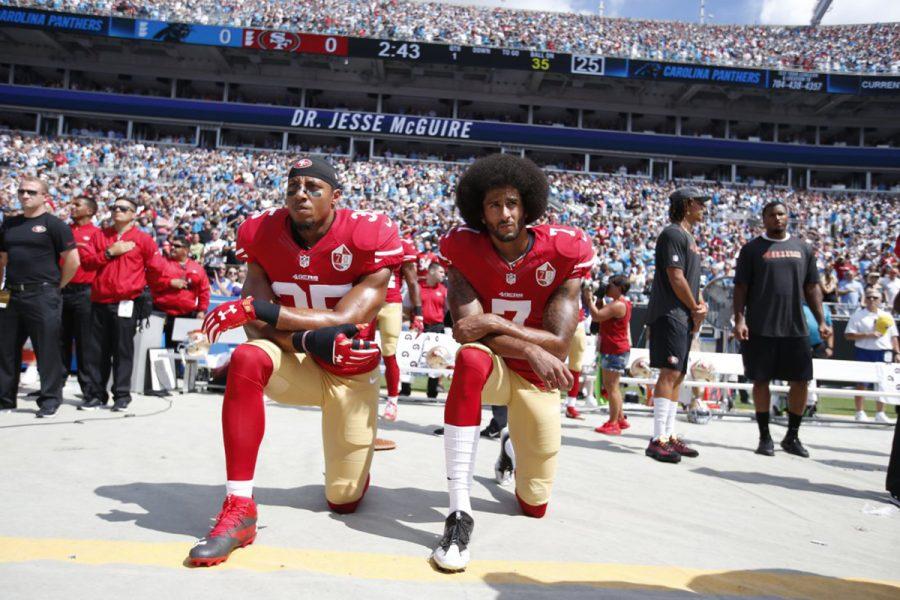Politics may be affecting one NFL player’s attractiveness to teams
Backlash from political stances taken by Colin Kaepernick raises questions over the line between politics and athletics
More stories from Hillary Smith
Photo by SUBMITTED
Colin Kaepernick sparked national controversy by kneeling during the national anthem at games last fall. Now, his activism may be affecting teams signing him.
If you have the spotlight, why not use it?
Well, because you might end up out of the job. Such is the case of National Football League (NFL) quarterback Colin Kaepernick, who left his contract with the San Francisco 49ers and to try his luck as a free agent. However, he has yet to be signed, and many are saying his lack of contract offers has less to do with his abilities and more to do with his political activism.
Kaepernick made headlines this past fall when he started kneeling during the pre-game national anthem, triggering national praise and criticism alike. He told media that he was not standing during the anthem in protest of racial inequalities and oppression in the nation.
Kaepernick was joined in his silent protests by teammates, fellow NFL players and athletes from other sports. The stands of solidarity resulted in a huge media storm along with many chipping in their opinions on whether the protests were appropriate or disrespectful.
Now, after opting out of the final year in his 49ers contract, Kaepernick is floating in the overcrowded see of free agency.
While some say Kaepernick hasn’t been signed because of the unwanted attention that comes with him, others argue it’s because he just isn’t that good. His stats uphold both arguments, showing weak points (a 3-16 record the past two seasons and 59.8 percent completion rate) and strong points (a career TD/INT ratio of 72 to 30 and his 88.9 passer rating).
An example of that aforementioned negative attention teams may be trying to avoid come from none other than President Donald J. Trump. In a speech Monday, the president cited a report suggesting his wrathful Twitter renegades may be affecting Kaepernick.
“It was reported that NFL owners don’t want to pick him up because they don’t want to get a nasty tweet from Donald Trump,” Trump said. “Do you believe that? I just saw that. I just saw that.”
The backlash Kaepernick received for kneeling was and is unwarranted. He was exercising his rights to free speech, using his position in the public spotlight to send a message he felt was important for the nation to hear. He criticized a nation that deserves criticism for the treatment of black people.
Kaepernick and every other player (and person in the U.S., for that matter) has the right to stand for their beliefs. However, teams also have the right to avoid a player they believe will be problematic, even if the athlete is able-bodied and talented.
The overall discussion and uncertainty of how Kaepernick’s activism may be affecting his attractiveness for NFL teams is simply a reality of the business; however, the debate points to larger concerns when it comes to national attitudes towards politics.
While Kaepernick’s kneeling during the anthem will probably always be a point of contention due to individual divergences in opinion and value, other actions have spoken even louder.
For instance, he pledged $1 million to organizations helping fight racial inequality. He helped secure a plane to take 60 tons of food to famished Somalia. He’s also funding a “Know Your Rights” campaign for young people to “raise awareness on higher education, self-empowerment, and instruction to properly interact with law enforcement in various scenarios.”
Why not use his spotlight to bring light to a serious national problem? Though his political statements aren’t necessarily the only thing preventing him from being signed, Kaepernick is still being unfairly punished for standing up for his rights.
This situation should force everyone to take a step back and consider whether or not the massive amounts of attention Kaepernick is receiving is warranted. Other NFL players have done far worse actions and yet have experienced less impact on their own athletic careers.
For example, Ray Lewis. Lewis spent his entire 17-year career with the Baltimore Ravens and is widely considered one of the best linebackers of all time.
His high-profile status is not without its dark sides; Lewis is also known for his connection in a gruesome double-murder, which remains unsolved to this day.
After an altercation leaving two men stabbed to death, Lewis was charged with murder, but ultimately struck a plea deal with police. He pled guilty to one count of obstruction of justice and testified against two of his friends who were also involved in the incident. Lewis received one year of probation and a $250,000 fine from the NFL.
For any normal person, being linked to a double-homicide would bring their career crashing to the ground. But Lewis came out relatively unscathed; he is the headline for the Pro Football Hall of Fame’s Class of 2018 and will go down in history as one of the best defensive players.
And while Lewis enjoys his revamped image Kaepernick is being blackballed for his legal, non-violent, generally beneficial activism.
It speaks more to the American people’s interests and priorities when NFL players committing violent crimes are largely ignored, but players expressing their informed concerns about relevant social topics are ripped to shreds in the media and avoided by teams. We as a country need to take a hard look at what we decide to get up in arms about.

